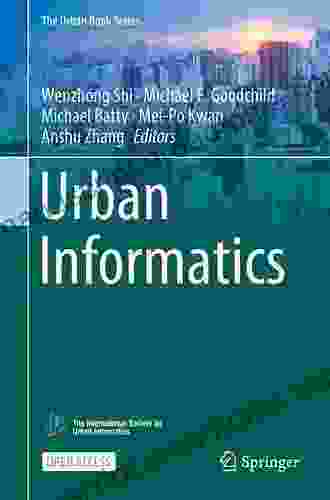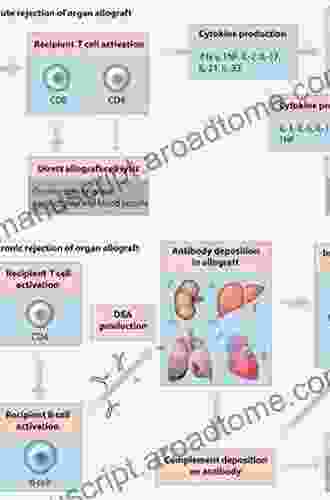Pulmonary Considerations in Solid Organ and Hematopoietic Stem Cell Transplantation

4.6 out of 5
| Language | : | English |
| File size | : | 35523 KB |
| Text-to-Speech | : | Enabled |
| Screen Reader | : | Supported |
| Enhanced typesetting | : | Enabled |
| Print length | : | 680 pages |
Pulmonary complications are a major cause of morbidity and mortality in patients undergoing solid organ and hematopoietic stem cell transplantation. The incidence of pulmonary complications in these patients is high, ranging from 20% to 50%. The most common pulmonary complications include pneumonia, acute respiratory distress syndrome (ARDS),and bronchiolitis obliterans syndrome (BOS). These complications can lead to significant morbidity, including prolonged hospital stays, increased healthcare costs, and even death.
Pulmonary Considerations in Solid Organ and Hematopoietic Stem Cell Transplantation provides a comprehensive overview of the pulmonary complications that can occur in patients undergoing these procedures. The book covers a wide range of topics, including the pathophysiology of pulmonary complications, the diagnostic and management strategies for these complications, and the long-term pulmonary outcomes of transplant patients.
Pathophysiology of Pulmonary Complications
The pathophysiology of pulmonary complications in transplant patients is complex and multifactorial. The following are some of the key factors that contribute to the development of these complications:
- Immunosuppression: Immunosuppressive drugs are used to prevent rejection of the transplanted organ or stem cells. However, these drugs can also suppress the immune system's ability to fight off infection.
- Ischemia-reperfusion injury: Ischemia-reperfusion injury occurs when blood flow to the transplanted organ or stem cells is interrupted and then restored. This can lead to damage to the pulmonary tissue.
- Aspiration: Aspiration of gastric contents into the lungs can occur during surgery or in the postoperative period. This can lead to pneumonia or ARDS.
- Ventilator-associated pneumonia (VAP): VAP is a type of pneumonia that develops in patients who are receiving mechanical ventilation. VAP is a common complication in transplant patients, who are often intubated and ventilated for prolonged periods of time.
Diagnosis of Pulmonary Complications
The diagnosis of pulmonary complications in transplant patients is based on a combination of clinical findings, chest radiography, and laboratory testing. The following are some of the key diagnostic tests that may be used to evaluate pulmonary complications in transplant patients:
- Chest radiography: Chest radiography is a useful screening tool for pulmonary complications. It can be used to detect infiltrates, consolidations, and other abnormalities in the lungs.
- Computed tomography (CT) scan: CT scans can provide more detailed images of the lungs than chest radiographs. CT scans can be used to diagnose pulmonary complications such as pneumonia, ARDS, and BOS.
- Bronchoscopy: Bronchoscopy is a procedure in which a thin, flexible tube is inserted into the lungs to visualize the airways and collect samples for testing. Bronchoscopy can be used to diagnose pulmonary complications such as pneumonia, ARDS, and BOS.
- Pulmonary function tests (PFTs): PFTs can be used to assess the function of the lungs. PFTs can be used to diagnose pulmonary complications such as BOS and restrictive lung disease.
Management of Pulmonary Complications
The management of pulmonary complications in transplant patients depends on the specific complication and its severity. The following are some of the key management strategies that may be used to treat pulmonary complications in transplant patients:
- Antibiotics: Antibiotics are used to treat pneumonia and other bacterial infections.
- Corticosteroids: Corticosteroids can be used to reduce inflammation in the lungs.
- Bronchodilators: Bronchodilators can be used to open up the airways and improve airflow.
- Mechanical ventilation: Mechanical ventilation may be necessary to support breathing in patients with severe pulmonary complications.
Long-Term Pulmonary Outcomes
The long-term pulmonary outcomes of transplant patients vary depending on the type of transplant and the severity of the pulmonary complications that develop. The following are some of the key long-term pulmonary outcomes that may be seen in transplant patients:
- BOS: BOS is a chronic lung disease that can develop in transplant patients. BOS is characterized by progressive scarring and narrowing of the airways. BOS can lead to significant disability and even death.
- Restrictive lung disease: Restrictive lung disease is a condition in which the lungs are unable to fully expand. Restrictive lung disease can be caused by a variety of factors, including BOS, interstitial lung disease, and pleural effusions.
- Obstructive lung disease: Obstructive lung disease is a condition in which the airways are obstructed. Obstructive lung disease can be caused by a variety of factors, including BOS, chronic bronchitis, and emphysema.
Pulmonary complications are a major cause of morbidity and mortality in patients undergoing solid organ and hematopoietic stem cell transplantation. The pathophysiology of pulmonary complications in these patients is complex and multifactorial. The diagnosis and management of pulmonary complications require a multidisciplinary approach involving pulmonologists, infectious disease specialists, and transplant surgeons. The long-term pulmonary outcomes of transplant patients vary depending on the type of transplant and the severity of the pulmonary complications that develop.
4.6 out of 5
| Language | : | English |
| File size | : | 35523 KB |
| Text-to-Speech | : | Enabled |
| Screen Reader | : | Supported |
| Enhanced typesetting | : | Enabled |
| Print length | : | 680 pages |
Do you want to contribute by writing guest posts on this blog?
Please contact us and send us a resume of previous articles that you have written.
 Book
Book Novel
Novel Page
Page Chapter
Chapter Text
Text Story
Story Genre
Genre Reader
Reader Library
Library Paperback
Paperback E-book
E-book Magazine
Magazine Newspaper
Newspaper Paragraph
Paragraph Sentence
Sentence Bookmark
Bookmark Shelf
Shelf Glossary
Glossary Bibliography
Bibliography Foreword
Foreword Preface
Preface Synopsis
Synopsis Annotation
Annotation Footnote
Footnote Manuscript
Manuscript Scroll
Scroll Codex
Codex Tome
Tome Bestseller
Bestseller Classics
Classics Library card
Library card Narrative
Narrative Biography
Biography Autobiography
Autobiography Memoir
Memoir Reference
Reference Encyclopedia
Encyclopedia Joseph Sandler
Joseph Sandler Chase Hill
Chase Hill Chaitanya Baliram Pande
Chaitanya Baliram Pande Massimo De Amicis
Massimo De Amicis Charles R Shrader
Charles R Shrader Chase Bourn
Chase Bourn Charlie Gilkey
Charlie Gilkey Chris Griscom
Chris Griscom Catrine Clay
Catrine Clay Charles Jencks
Charles Jencks Chris Barns
Chris Barns Teju Cole
Teju Cole Cathy Vartuli
Cathy Vartuli Charles Mackay
Charles Mackay Chef Effect
Chef Effect Nikki Long
Nikki Long Veronica Strachan
Veronica Strachan Chris Love
Chris Love Joost Abraham Maurits Meerloo
Joost Abraham Maurits Meerloo Kathryn Warner
Kathryn Warner
Light bulbAdvertise smarter! Our strategic ad space ensures maximum exposure. Reserve your spot today!

 Jorge Luis BorgesDiscover the Path to Ethical Living with "Urantia Work Book: Applied Urantian...
Jorge Luis BorgesDiscover the Path to Ethical Living with "Urantia Work Book: Applied Urantian... Enrique BlairFollow ·2.8k
Enrique BlairFollow ·2.8k Anthony BurgessFollow ·6.2k
Anthony BurgessFollow ·6.2k Liam WardFollow ·12.2k
Liam WardFollow ·12.2k Dean CoxFollow ·4.2k
Dean CoxFollow ·4.2k Bryson HayesFollow ·2.9k
Bryson HayesFollow ·2.9k Chandler WardFollow ·12.8k
Chandler WardFollow ·12.8k Jace MitchellFollow ·7.9k
Jace MitchellFollow ·7.9k Edwin CoxFollow ·2.9k
Edwin CoxFollow ·2.9k

 Esteban Cox
Esteban CoxYour Yearly Monthly Weekly Daily Guide To The Year Cycle:...
As we navigate the ever-changing currents...

 George Orwell
George OrwellIdentifying and Understanding Astronomical and...
Prepare to embark on an extraordinary...

 Arthur Conan Doyle
Arthur Conan DoyleYour Yearly Monthly Weekly Daily Guide to the Year Cycle:...
Welcome to "Your Yearly Monthly Weekly Daily...

 Steve Carter
Steve CarterUrban Informatics: Unlocking the Secrets of Smart Cities...
An In-Depth Exploration of Urban...

 Henry Hayes
Henry HayesUnveil the Secrets of the Order of the Solar Temple: A...
In the realm of secret...
4.6 out of 5
| Language | : | English |
| File size | : | 35523 KB |
| Text-to-Speech | : | Enabled |
| Screen Reader | : | Supported |
| Enhanced typesetting | : | Enabled |
| Print length | : | 680 pages |












